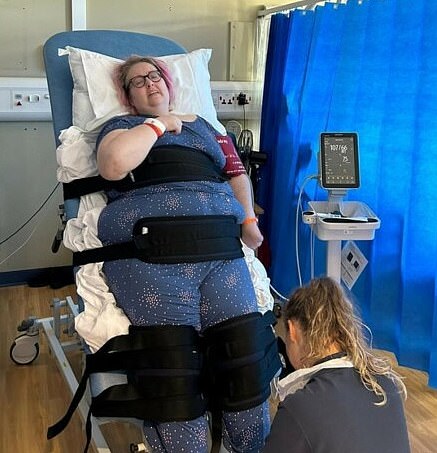A grandmother was left screaming in agony and faces disability for life after suffering a life-wrecking complication of weight loss surgery abroad.
Danielle Peebles, 42, was initially paralysed from the waist down and unable to eat following the procedure – which was performed by a clinic in Turkey.
She has since defied doctors’ predictions that she’d ‘never walk again’, and can walk slowly using crutches, but expects to suffer some form of disability for life.
Ms Peebles underwent the procedure to remove a portion of her stomach in the summer of 2023, known medically as a gastric sleeve.
She paid just £2,995 for the operation, nearly three times less than the £8,500 it costs to have the surgery preforming privately in Britain.
Weighing 28st (178kg), the mother was desperate to shed her excess weight and be able to ‘push her baby grandson around the park’.
Initially she was pleased with results, with the operation going smoothly in what she described as a ‘beautiful hospital’.
But the first signs of a problem started the moment she got home.

A grandmother was told she may never walk again after she being paralysed following a budget-weight loss operation in Turkey
‘I just couldn’t eat, I couldn’t keep anything down, I could barely have any liquid. That carried on for weeks and months, I just couldn’t tolerate anything,’ she said.
Mrs Peebles eventually sought help from the NHS in December that year.
At the time, medics told her she was seriously dehydrated and was placed on a drip to bring her fluids up.
But her condition took a dramatic turn in January 2024 when she felt her legs go numb and collapsed.
She recalled waking up in shock and finding herself in a bed in Salford Royal hospital.
‘When I came round, I was paralysed from the neck down and couldn’t walk,’ she said.
While unable to move, she could feel agonising pain in her feet that flared up at the ‘slightest touch’, leaving her ‘screaming’.
Medics eventually diagnosed her as having a severe vitamin deficiency called nutritional neuropathy.

Weighing 28st (178kg) Mrs Peebles was desperate to shed her excess weight and be able to ‘push her baby grandson around the park’ but feared a long wait to get an operation on the NHS. Pictured before her operation
The lack of vital nurtients had starved her nerves – the tissue in the body that sends signals between the brain and the muscles that tells them to move.
Devastatingly, her medical team said that this damage could be permanent.
‘I was told I had very severe nerve damage and might not walk again,’ she said.
‘The surgical side of my procedure had all been fine, it was how my body dealt with it.
‘You don’t hear that you can get nutritional neuropathy from not eating. You’re not told about these side effects because they’re so rare.
‘The surgery had totally backfired.’
Ms Peebles remained at Salford Royal Hospital for five months as medics tried to restore her nerve function via an intensive rehabilitation plan.
Slowly she started regaining sensation in her limbs and eventually managed to leave the unit on crutches.

On her recovery she said: ‘It takes a lot of repetitive movements to get the nerves to link back to the brain again. It starts with getting your fingers moving again first.
Today, she ‘can walk’ but said she has a ‘long way to go’.
‘I’m still doing more than I ever thought I would,’ she added.
She recently reunited with the medical team that she credits with helping her walk again.
In particular she thanked NHS neurologist Dr Dan Whittam.
Speaking at their reunion Dr Whittam said he ‘almost didn’t recognise her’.
‘To see her walking without even a crutch really exceeded my expectations and her determination has been inspiring,’ he said.
Mrs Peebles said she had been desperate to lose weight but never realised the price she would pay.
‘It’s a long wait on the NHS for surgery and I appreciate that, no one could really tell me how long that was going to be,’ she said.
‘I was trying to improve myself, and be a better mum and a better nana as quickly as possible as my grandson was about to be born.
‘I was doing what I thought was best for us.’
Nutritional neuropathy is a known complication of weight-loss surgery, with some studies suggesting it may affect up to one in six patients.
Patients who undergo gastric surgeries can suffer nutritional problems as their drastically reduced stomach size and appetites can leave them deficient in critical vitamins.
Nerve problems most commonly occur due to a lack of B vitamins which re commonly found in some fresh fruit and vegetables, dairy products, meat and eggs.
Medics have previously warned that an increasing number of Britons are dying or needed emergency care after jetting abroad for cut-price obesity surgery
The crisis has been blamed fuelling delays for routine care, such as hip and knee replacements, because these health tourists are increasingly occupying NHS beds,
Around 5,000 people a year go overseas for obesity surgery, where procedures can be significantly cheaper than going private closer to home.
This article was originally published by a www.dailymail.co.uk . Read the Original article here. .


